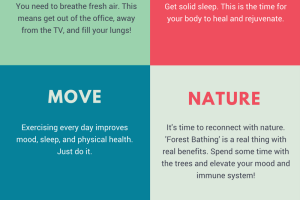Unlock the Key to Long-Term Health and Wellbeing

Importance of Prioritizing Long-Term Health
In today’s fast-paced world, it is easy to get caught up in the hustle and bustle of daily life. Many individuals prioritize immediate demands – work, social obligations, or even personal indulgences – often at the expense of their long-term health. However, investing in long-term health is crucial for a fulfilling life ahead. Consider this: when you take the time to focus on your health now, you reap numerous benefits down the line. Here are some key reasons to prioritize long-term health:
- Unlock the Key to Long-Term Health and Wellbeing
- Importance of Prioritizing Long-Term Health
- Understanding Long-Term Health and Wellbeing
- The Impact of Lifestyle Choices
- Establishing Healthy Habits
- Nutrition and Diet
- Regular Physical Activity
- Mental Health and Wellbeing
- Stress Management Techniques
- Importance of Rest and Sleep
- Social Connections and Support
- Building Strong Relationships
- The Role of Community in Wellbeing
- Preventive Healthcare Measures
- Regular Check-Ups and Screenings
- Vaccinations and Immunizations
- Holistic Approaches to Health
- Integrating Mind-Body Practices
- Investing in Self-Care
- Prioritizing Me-Time
- Setting Boundaries for Self-Preservation
- Prevention over Cure: A healthy lifestyle can significantly reduce the risk of chronic diseases such as diabetes, heart disease, and obesity.
- Enhanced Quality of Life: Engaging in healthy habits ensures that you have the energy and vitality to enjoy life’s moments with friends and family.
- Economic Benefits: Less spending on healthcare costs over time, leading to significant savings.
A personal story comes to mind: a friend of mine decided to start walking daily. Over the months, not only did she shed extra pounds, but she also found herself feeling more energetic and happier overall. This simple habit changed her life trajectory. By focusing on long-term health today, we pave the way for a brighter, healthier tomorrow.
Understanding Long-Term Health and Wellbeing
The Impact of Lifestyle Choices
Now that the importance of prioritizing long-term health has been established, it’s essential to understand how our everyday lifestyle choices greatly impact our overall wellbeing. Each decision, no matter how small, contributes to our health trajectory. Consider simple daily choices: what you eat, how much you move, and how you manage stress all play pivotal roles in shaping your future health. Here’s a breakdown of how lifestyle choices influence long-term health:
- Nutrition: A diet rich in fruits, vegetables, whole grains, and lean proteins not only fuels the body but also provides essential nutrients that have lasting positive effects. For instance, a friend who switched from processed snacks to nuts and fruit found her energy levels soared and her cravings diminished.
- Physical Activity: Regular exercise strengthens the heart and muscles, improves mood, and enhances mental clarity. Just a brisk 30-minute walk daily can lead to significant health benefits over time.
- Mental Wellbeing: Our psychological health is equally important. Engaging in mindfulness practices or hobbies reduces stress and fosters resilience. A colleague who took up meditation reported feeling calmer and better able to cope with life’s challenges.
By making conscious lifestyle choices, we can create a strong foundation for a healthier future.
Establishing Healthy Habits
Nutrition and Diet
Building upon the understanding of how lifestyle choices influence health, establishing healthy habits is crucial in the journey towards long-term well-being. Nutrition and diet form the cornerstone of these habits. Adopting mindful eating practices not only nourishes the body but also aligns with your health goals. Here are some tips for cultivating healthier eating habits:
- Plan Your Meals: Meal planning can save time and prevent impulse eating. Knowing what you’ll eat each day cuts down on unhealthy choices.
- Portion Control: Being mindful of portion sizes is essential. Sometimes, simply reducing portions can lead to significant changes in weight and health.
- Choose Whole Foods: Opt for whole, unprocessed foods over packaged options. They are often richer in nutrients and lower in unhealthy fats.
One personal success story comes to mind: a family member began incorporating more whole foods into their diet and noticed significant improvements in energy levels and digestion.
Regular Physical Activity
In addition to a balanced diet, regular physical activity is a fundamental aspect of establishing healthy habits. Movement doesn’t have to be overly intense or time-consuming; consistency is key. Simple changes can make a big difference:
- Find Activities You Enjoy: Whether it’s dancing, hiking, or biking, engaging in physical activities you love increases the likelihood of sticking with them.
- Set Realistic Goals: Start with achievable goals, like a 20-minute walk a few times a week. Gradually increase duration or intensity as you grow more comfortable.
- Incorporate Movement into Daily Life: Opt for stairs instead of elevators or take short walking breaks during work hours.
A friend of mine made walking a family activity, and now they enjoy healthier lives together while bonding over their shared commitment to fitness. By intentionally focusing on nutrition and exercise, individuals set the stage for lasting health transformations.
Mental Health and Wellbeing
Stress Management Techniques
As we’ve discussed the importance of nutrition and physical activity, it’s equally essential to address mental health and wellbeing. Stress can significantly affect overall health, making effective stress management techniques crucial for long-term wellbeing. Here are a few strategies that can help navigate daily stressors:
- Mindfulness and Meditation: Taking just a few minutes each day to practice mindfulness can help center the mind and promote relaxation. I started meditating every morning, and the clarity I gained for the rest of the day was remarkable.
- Breathing Exercises: Simple breathing techniques, such as inhaling deeply through the nose and exhaling slowly through the mouth, can reduce anxiety levels and bring immediate calm.
Recognizing and addressing stress is vital, as chronic stress can lead to numerous health problems.
Importance of Rest and Sleep
In addition to managing stress, prioritizing rest and sleep is fundamental to mental health. Here’s why quality sleep matters and how to ensure you get it:
- Restores the Body: During sleep, the body repairs itself, supporting physical and mental health. A friend of mine who struggled with sleeplessness noticed an increase in focus and mood after establishing a consistent sleep schedule.
- Establish a Routine: Going to bed and waking up at the same time every day can help regulate the body’s internal clock.
- Create a Relaxing Environment: Dimming the lights, reducing noise, and keeping the bedroom cool can enhance sleep quality.
By incorporating effective stress management techniques and ensuring a good night’s sleep, individuals can foster resilience and improve their mental health, setting the stage for overall wellbeing.
Social Connections and Support
Building Strong Relationships
Following the focus on mental health, it’s crucial to highlight the impact of social connections on overall wellbeing. Building strong relationships fosters a sense of belonging and provides much-needed emotional support. Here are a few strategies for nurturing these important connections:
- Invest Time in Relationships: Make an effort to spend quality time with friends and family. Whether it’s a weekly coffee date or game night, these gatherings strengthen bonds and create lasting memories.
- Open Communication: Share your thoughts and feelings openly with loved ones. This fosters trust and deeper connections. A personal experience comes to mind, as I found vulnerability with friends led to richer, more meaningful conversations.
- Be Supportive: Offer a listening ear or a helping hand when needed. Supporting others often creates a reciprocal environment where everyone thrives.
The Role of Community in Wellbeing
In addition to personal relationships, belonging to a community plays a significant role in our wellbeing. Communities can support emotional health in numerous ways:
- Shared Interests: Engaging in community activities or groups based on common interests can enhance social connections and happiness.
- Local Events: Participating in local festivals, workshops, or volunteering can strengthen communal ties and give a sense of purpose.
- Access to Resources: Communities often provide resources like mental health services or fitness programs, making it easier to adopt healthy habits.
By building strong relationships and fostering community connections, individuals can cultivate a support network that enhances emotional resilience and overall wellbeing.
Preventive Healthcare Measures
Regular Check-Ups and Screenings
After discussing the importance of social connections and community wellbeing, it’s time to focus on preventive healthcare measures. Regular check-ups and screenings are essential for catching health issues before they escalate. Here’s why they matter:
- Early Detection: Routine screenings, such as blood pressure checks, cholesterol tests, and annual physicals, can identify potential health problems early on. For instance, during a routine check-up, a friend of mine discovered elevated cholesterol levels, allowing him to make necessary lifestyle changes before serious complications arose.
- Tracking Health Changes: Regular visits to your healthcare provider help establish a health baseline, enabling better tracking of any changes or trends over time.
Vaccinations and Immunizations
In addition to check-ups, vaccinations and immunizations play a crucial role in maintaining long-term health. They protect not only individuals but also communities at large. Consider the following benefits:
- Disease Prevention: Vaccinations help protect against serious illnesses such as flu, measles, and COVID-19, significantly reducing the likelihood of outbreaks.
- Public Health Contribution: When communities achieve high vaccination rates, they create herd immunity that protects vulnerable populations.
A personal anecdote highlights this: after getting vaccinated against the flu last year, I not only avoided illness but also felt reassured knowing I wasn’t putting others at risk. By prioritizing regular check-ups and ensuring up-to-date vaccinations, individuals can take significant steps toward safeguarding their long-term health.
Holistic Approaches to Health
Integrating Mind-Body Practices
Having explored preventive healthcare measures, it’s essential to recognize the value of holistic approaches to health. Integrating mind-body practices can significantly enhance overall wellbeing by fostering harmony between mental and physical health. Here are some effective methods to consider:
- Yoga and Tai Chi: These mindful practices promote flexibility, balance, and relaxation while reducing stress. A close friend of mine took up yoga and found it not only improved her physical strength but also provided a peaceful escape from daily worries.
- Meditation: Regular meditation can reduce anxiety and improve focus, leading to a clearer and more balanced mind. Even setting aside just 10 minutes a day can help establish this beneficial routine.
- Breathwork: Simple breathing exercises can effectively manage stress and anxiety levels, grounding you in the present moment. I’ve found that a few deep breaths before starting the day can set a positive tone for what lies ahead.
Integrating these mind-body practices into daily life fosters resilience and enhances the ability to manage stress and challenges. By prioritizing holistic approaches to health, individuals can cultivate a deeper connection to both their bodies and minds, contributing to long-lasting wellbeing.
Investing in Self-Care
Prioritizing Me-Time
Transitioning from holistic approaches to health, it’s vital to emphasize the importance of investing in self-care. In our busy lives, many people neglect their personal needs, but prioritizing “me-time” is essential for maintaining balance and wellbeing. Here’s how to carve out time for yourself:
- Schedule It: Just as you would schedule a work meeting, block out time in your calendar for self-care activities. Treat these moments as sacred appointments that shouldn’t be missed.
- Engage in Hobbies: Reconnect with activities that bring you joy—whether it’s reading, gardening, or painting. A colleague of mine rediscovered her love for painting and now dedicates time each week to create, finding peace and satisfaction.
Setting Boundaries for Self-Preservation
In addition to prioritizing personal time, setting boundaries is crucial for self-preservation. Protecting your mental and emotional space can lead to healthier relationships and improved overall wellbeing:
- Learn to Say No: It’s okay to decline invitations or requests that overwhelm you. By doing so, you prioritize your own needs without feeling guilty.
- Limit Screen Time: Unplugging from digital distractions can free up precious time for self-reflection and relaxation.
A personal example illustrates this: I recently decided to turn off phone notifications during weekends to focus on family and recharging my own energy. By investing in self-care through “me-time” and setting boundaries, individuals can cultivate a healthier mindset and refresh their spirits.





